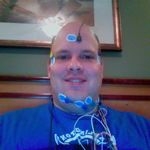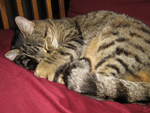general anaesthetic
general anaesthetic
I am shortly to go into hospital for an operation and have been told to take in my cpap machine.
I usually use my machine in Auto mode but would it be better to set it to CPAP mode for the recovery period after the
tubes have been removed in the operating theatre? If so, should my CPAP pressure be set to 2 or 3 units above the APAP 95th centile pressure or the median pressure.
Any advice would be greatly appreciated.
I usually use my machine in Auto mode but would it be better to set it to CPAP mode for the recovery period after the
tubes have been removed in the operating theatre? If so, should my CPAP pressure be set to 2 or 3 units above the APAP 95th centile pressure or the median pressure.
Any advice would be greatly appreciated.
- chunkyfrog
- Posts: 34451
- Joined: Mon Jul 12, 2010 5:10 pm
- Location: Nebraska--I am sworn to keep the secret of this paradise.
Re: general anaesthetic
Normal settings, favorite mask, new filter. (unless doc says otherwise.)
Put your name on everything so no one tosses it.
Put your name on everything so no one tosses it.
_________________
| Mask: AirFit™ P10 For Her Nasal Pillow CPAP Mask with Headgear |
| Additional Comments: Airsense 10 Autoset for Her |
Re: general anaesthetic
I would check with the hospital to see if they can provide one. I would be hesitant to bring any more than just my mask in with me. I would guess you pulmonologist would be willing to send your prescription to them along with any recommendation for pressure adjustments. I would say my apnea was worse in the hospital, the anesthetic makes you relax even more and those beds make you sleep on your back. I had a horrible time sleeping after my surgery last May 2011 but I wasn't on my CPAP yet.
_________________
| Mask: Mirage™ FX Nasal CPAP Mask with Headgear |
| Additional Comments: PR FullLife FFM as backup, SleepyHead v0.92 for Mac |
Re: general anaesthetic
I'd go along with this. Talk to both your Surgeon and the Anesthesiologist. You'll need Doctor's orders to use your machine and the Anesthesiologist may even want you to use it in the recovery room after extubation. Depending on his attitude and openness to newer ideas.chunkyfrog wrote:Normal settings, favorite mask, new filter. (unless doc says otherwise.) Put your name on everything so no one tosses it.
Regarding the idea of using a hospital provided machine. One extra cost you would incur...and who knows what kind of machine they would provide you with. Perhaps even a ventilator with cpap options. Better off with your own familiar machine.,,is my thinking.
J
Re: general anaesthetic
I was told to bring my own machine etc if I ever had to go to the hospital. last summer I had a surgical procedure. During the procedure it became necessary to switch me from propofol (sp?) to genera anesthesial. They used some type of device to keep my throat open when they switched to general. Just be sure that you make it clear to the anesthesiologist that you have OSA when you have your pre-surgery interview. Make sure you write it on any forms you have to fill out too. It went fine for me and I am sure it will for you too. I did not have to stay over so I did not bring my machine but I would have if I had to stay a day or two in the hospital.
_________________
| Mask: Quattro™ FX Full Face CPAP Mask with Headgear |
| Humidifier: S9™ Series H5i™ Heated Humidifier with Climate Control |
Re: general anaesthetic
When being admitted to hospital I have told my surgeon, anesthesiologist and all staff that I come into contact with plus written in onto any forms I've been given to complete. I've had a couple of ops and each time my equipment has followed me faithfully around. Unfortunately no-one actually hooked me up to it. By the time you are awake enough to notice there is no need to bother.
I have come to the conclusion that they don't know much, if anything, about OSA. Hope you have more luck, let us know.
I have come to the conclusion that they don't know much, if anything, about OSA. Hope you have more luck, let us know.
Re: general anaesthetic
I don't agree. Drugs from anesthesia hang around for hours. People drift in and out of sleep pretty much the whole day after anesthesia. And another secondary issue is that cpap could help with alveoli inflation. Atalectasis (collapse of alveoli) is a common post-op complication that can lead to pneumonia. CPAP could reduce that risk.Ms Piggy wrote: By the time you are awake enough to notice there is no need to bother.
J
Re: general anaesthetic
No.KrisasMan wrote:I would check with the hospital to see if they can provide one.
The best they could do would be a ventilator in CPAP mode. A home CPAP machine is better for our purposes and no hospital keeps any sitting around.
_________________
| Mask: Swift™ FX Nasal Pillow CPAP Mask with Headgear |
| Humidifier: S9™ Series H5i™ Heated Humidifier with Climate Control |
| Additional Comments: Don't assume physicians have an easier time getting information or resources from equipment manufacturers! |
Untreated AHI: 86
Treated AHI: 0.4
Treated AHI: 0.4
Re: general anaesthetic
WARNING! A LONG POST. These are my "feelings" and are NOT medical advise.
Welcome to our focus group and for asking your question. Take your own CPAP machine with you set at normal settings. Put you name on it. Use a new filter in the hospital. I would change to another new filter once I got home. Recovery rooms don't have spare CPAP machines just lying around for patients to use. Note: I talk about SDB-sleep disordered breathing, which includes obstructive and central apneas and hypopneas.
When you talk with your surgeon, take a copy of your XPAP prescription with you. Take a copy of your sleep study, or at least your AHI with you, along with details of obstructive hypopneas/apneas v. central hypopneas/apneas. If there is any question of being done in a surgery center or not your surgeon needs to contact your anesthesiologist before the day of surgery.
Your anesthesiologist is your FRIEND! Your anesthesiologist will be taking care of all of you medical problems while in the O.R. in addition to doing your anesthetic. In many institutions you will be asked to complete a "STOP-BANG" questionaire to evaluate your risk of OSA (obstructive sleep apnea) before you see your anesthesiologist. OSA is severely under diagnosed in the U.S. If you are diagnosed with SDB- Sleep Disordered Breathing, obstructive and/or central breathing problems, he will want the same info as noted above.
He (she) will also be very interested in your airway for two reasons. First, he need to know that he can manage your airway, how difficult it would be to intubate your airway (with an endotracheal tube) or use an LMA if need be. For that he will be looking at your teeth, the shape of your mouth, how wide you can open your mouth, any TMJ?, how well you can tilt your head back (any herniated discs in your neck, or neck surgery that freezes your neck), how heavy you are, circumference of your neck,calculating your Mallanpati score, etc. If you are "normal" this may take a few seconds of his simply observing you. All of this is the routine for every patient. "Sleep apnea" doesn't make managing you airway any more difficult or risky in the O.R., but it may make a difference in how your airway is managed in the O.R. He will also be interested in the type of operation, how long that surgeon takes for that operation, whether your surgery is scheduled early in the am or in the pm, whether or not you have other medical problems, especially asthma, COPD, emphysema, muscle weakness (neurological disease, post-polio, muscle status (very frail and weak vs athlete)), type of anesthetic, whether you will need to be intubated or have an LMA, etc.
The inceased risks of sleep apnea occur in the Recovery Room or PACU (post anesthesia care unit). This is the second reason why he is so interested in your airway. Some items listed above indicate a much higher risk for breathing problems in the PACA than others. The risks include DEATH!; apnea=respiratory arrest; shallow breathing causing atelectasis and possibly pneumonia, heart problems, delirium, hypoxia,etc.
Several things are happening in the PACU: the anesthetic gases are blowing off and the IV medications are being redistributed and metabolized; if your muscles were paralyzed during the operation they are now getting stronger over the next 45 minutes; your breathing control system is waking up-all helping you wake up and become stronger and breath better. But in patients with SDB this recovery time can be prolonged by several hours. In addition, most patients have pain when they wake up, so we give them narcotics and sedatives during the anesthetic and afterwards in the PACU. Guess what! Narcotics and sedatives cause the breathing control system to go back to sleep again-an effect that is amplified in patients with SDB. We must balance give the patient pain relief and the patient breathing. Therefore what would have been a normal 30 minute "wake up" in a healthy person may become a 2-4 hour struggle in the person with SDB. Because of these life-threatening risks in the PACU, the American Society of Anesthesiologists (ASA) mandate a 5 hour stay AFTER the last documented problem with breathing-apnea, hypopnea, desaturation, etc. Therefore it may not be safe to release a patient with SDB for 7-9 hours after they arrive in the PACU. Most Surgery Centers close their doors at 5 pm. See the problem with Surgery Centers? And for the SDB patient that has to be re-intubated in the PACU and transferred to an ICU on a ventilator-very difficult problems for the Surgery Center. Insurance companies/HMOs/PPOs all like Surgery Centers so they can save money. The money motive could be a very real and present danger to your life. (I love Surgery Centers! For the healthy patient they offer many advantages and are wonderful. But I am fed up with the ever increasing push to do sicker and sicker patients there in order to save money! or surgeon convenience!).
If you have SDB your anesthesiologist may "push" you a bit on using alternates to a general anesthetic, or adding supplements to your general anesthetics. Any regional anesthetic or peripheral nerve block has decreased risks for SDB. A regional anesthetic and/or peripheral nerve blocks with a general anesthetic decreases your risks from SDB. Using local anesthesia with sedation also decreases your risks. Your anesthesiologist has had 4 years of college, 4 years of medical school, and 5-6 years of an anesthesia residency/fellowship. He has a very real understanding of the risks of anesthetics, especially for patients with SDB.
I hope you surgery goes well! Keep us informed.
Michael Kim Comstock, M.D.
Diplomat, American Board of Anesthesiologists.
To the Forum in General:
I don't like to "expound" as a doctor on this forum. That's not what this forum is for. But this area is so misunderstood I wanted to clarify it. If there are other questions about "anesthesiology" that interest the forum I will be happy to respond. Otherwise I will not bore you.
Welcome to our focus group and for asking your question. Take your own CPAP machine with you set at normal settings. Put you name on it. Use a new filter in the hospital. I would change to another new filter once I got home. Recovery rooms don't have spare CPAP machines just lying around for patients to use. Note: I talk about SDB-sleep disordered breathing, which includes obstructive and central apneas and hypopneas.
When you talk with your surgeon, take a copy of your XPAP prescription with you. Take a copy of your sleep study, or at least your AHI with you, along with details of obstructive hypopneas/apneas v. central hypopneas/apneas. If there is any question of being done in a surgery center or not your surgeon needs to contact your anesthesiologist before the day of surgery.
Your anesthesiologist is your FRIEND! Your anesthesiologist will be taking care of all of you medical problems while in the O.R. in addition to doing your anesthetic. In many institutions you will be asked to complete a "STOP-BANG" questionaire to evaluate your risk of OSA (obstructive sleep apnea) before you see your anesthesiologist. OSA is severely under diagnosed in the U.S. If you are diagnosed with SDB- Sleep Disordered Breathing, obstructive and/or central breathing problems, he will want the same info as noted above.
He (she) will also be very interested in your airway for two reasons. First, he need to know that he can manage your airway, how difficult it would be to intubate your airway (with an endotracheal tube) or use an LMA if need be. For that he will be looking at your teeth, the shape of your mouth, how wide you can open your mouth, any TMJ?, how well you can tilt your head back (any herniated discs in your neck, or neck surgery that freezes your neck), how heavy you are, circumference of your neck,calculating your Mallanpati score, etc. If you are "normal" this may take a few seconds of his simply observing you. All of this is the routine for every patient. "Sleep apnea" doesn't make managing you airway any more difficult or risky in the O.R., but it may make a difference in how your airway is managed in the O.R. He will also be interested in the type of operation, how long that surgeon takes for that operation, whether your surgery is scheduled early in the am or in the pm, whether or not you have other medical problems, especially asthma, COPD, emphysema, muscle weakness (neurological disease, post-polio, muscle status (very frail and weak vs athlete)), type of anesthetic, whether you will need to be intubated or have an LMA, etc.
The inceased risks of sleep apnea occur in the Recovery Room or PACU (post anesthesia care unit). This is the second reason why he is so interested in your airway. Some items listed above indicate a much higher risk for breathing problems in the PACA than others. The risks include DEATH!; apnea=respiratory arrest; shallow breathing causing atelectasis and possibly pneumonia, heart problems, delirium, hypoxia,etc.
Several things are happening in the PACU: the anesthetic gases are blowing off and the IV medications are being redistributed and metabolized; if your muscles were paralyzed during the operation they are now getting stronger over the next 45 minutes; your breathing control system is waking up-all helping you wake up and become stronger and breath better. But in patients with SDB this recovery time can be prolonged by several hours. In addition, most patients have pain when they wake up, so we give them narcotics and sedatives during the anesthetic and afterwards in the PACU. Guess what! Narcotics and sedatives cause the breathing control system to go back to sleep again-an effect that is amplified in patients with SDB. We must balance give the patient pain relief and the patient breathing. Therefore what would have been a normal 30 minute "wake up" in a healthy person may become a 2-4 hour struggle in the person with SDB. Because of these life-threatening risks in the PACU, the American Society of Anesthesiologists (ASA) mandate a 5 hour stay AFTER the last documented problem with breathing-apnea, hypopnea, desaturation, etc. Therefore it may not be safe to release a patient with SDB for 7-9 hours after they arrive in the PACU. Most Surgery Centers close their doors at 5 pm. See the problem with Surgery Centers? And for the SDB patient that has to be re-intubated in the PACU and transferred to an ICU on a ventilator-very difficult problems for the Surgery Center. Insurance companies/HMOs/PPOs all like Surgery Centers so they can save money. The money motive could be a very real and present danger to your life. (I love Surgery Centers! For the healthy patient they offer many advantages and are wonderful. But I am fed up with the ever increasing push to do sicker and sicker patients there in order to save money! or surgeon convenience!).
If you have SDB your anesthesiologist may "push" you a bit on using alternates to a general anesthetic, or adding supplements to your general anesthetics. Any regional anesthetic or peripheral nerve block has decreased risks for SDB. A regional anesthetic and/or peripheral nerve blocks with a general anesthetic decreases your risks from SDB. Using local anesthesia with sedation also decreases your risks. Your anesthesiologist has had 4 years of college, 4 years of medical school, and 5-6 years of an anesthesia residency/fellowship. He has a very real understanding of the risks of anesthetics, especially for patients with SDB.
I hope you surgery goes well! Keep us informed.
Michael Kim Comstock, M.D.
Diplomat, American Board of Anesthesiologists.
To the Forum in General:
I don't like to "expound" as a doctor on this forum. That's not what this forum is for. But this area is so misunderstood I wanted to clarify it. If there are other questions about "anesthesiology" that interest the forum I will be happy to respond. Otherwise I will not bore you.
Re: general anaesthetic
Be SURE to bring your own mask and be sure they use it.
Some hospital masks do NOT have exhale vents and could kill you. Note that the exhaust vent is NOT the same as the anti-asphyxia valve on most face masks.
Also, lots of hospital nurses, techs, and even doctors are very ignorant about CPAP. And "often wrong but never uncertain."
Also, a lot of the "often wrong but never uncertain" crowd think that oxygen will take care of this. W R O N G. Oxygen in your nose does you no good if your airway is closed and you're not breathing. Lots of people in a hospital will just smile and ignore you if you tell them this.
If you do need oxygen, it needs to be PROPERLY hooked up to your CPAP. Also, if the CPAP is shut off, the oxygen needs to be shut off as well, so oxygen doesn't back up into the CPAP machine.
Some hospital masks do NOT have exhale vents and could kill you. Note that the exhaust vent is NOT the same as the anti-asphyxia valve on most face masks.
Also, lots of hospital nurses, techs, and even doctors are very ignorant about CPAP. And "often wrong but never uncertain."
Also, a lot of the "often wrong but never uncertain" crowd think that oxygen will take care of this. W R O N G. Oxygen in your nose does you no good if your airway is closed and you're not breathing. Lots of people in a hospital will just smile and ignore you if you tell them this.
If you do need oxygen, it needs to be PROPERLY hooked up to your CPAP. Also, if the CPAP is shut off, the oxygen needs to be shut off as well, so oxygen doesn't back up into the CPAP machine.
_________________
| Mask: Swift™ FX Nasal Pillow CPAP Mask with Headgear |
| Humidifier: S9™ Series H5i™ Heated Humidifier with Climate Control |
| Additional Comments: Also SleepyHead, PRS1 Auto, Respironics Auto M series, Legacy Auto, and Legacy Plus |
Please enter your equipment in your profile so we can help you.
Click here for information on the most common alternative to CPAP.
If it's midnight and a DME tells you it's dark outside, go and check for yourself.
Useful Links.
Click here for information on the most common alternative to CPAP.
If it's midnight and a DME tells you it's dark outside, go and check for yourself.
Useful Links.
- happysleeper
- Posts: 162
- Joined: Sun Oct 25, 2009 7:40 pm
Re: general anaesthetic
Thanks Sandman19 for your clear information. I have a question for you...
Recently I was offered the opportunity to have a laser surgery on my feet for plantar fasciitis. They wanted to sedate me with "twilight sleep", probably versed, in the OR. I was advised that my CPAP machine could not go into the OR, and that I would only need a nurse, not a nurse-anesthetist, to administer the sedative. I decided to wait to have this done, as I wanted to see if time doing the exercises would help my foot get better, and I was worried about myself being asleep without being intubated or the CPAP machine, and without at least an anesthetist to guard my airway.
Is it considered safe for someone with OSA to have "twilight sleep" without an anesthetist/intubation/CPAP?
Thanks,
Happy Sleeper
Recently I was offered the opportunity to have a laser surgery on my feet for plantar fasciitis. They wanted to sedate me with "twilight sleep", probably versed, in the OR. I was advised that my CPAP machine could not go into the OR, and that I would only need a nurse, not a nurse-anesthetist, to administer the sedative. I decided to wait to have this done, as I wanted to see if time doing the exercises would help my foot get better, and I was worried about myself being asleep without being intubated or the CPAP machine, and without at least an anesthetist to guard my airway.
Is it considered safe for someone with OSA to have "twilight sleep" without an anesthetist/intubation/CPAP?
Thanks,
Happy Sleeper
Re: general anaesthetic
Dear Happysleeper, Again, I am giving my opinion and not medical advise. And I use "he" for "he/she". As a general rule I would insist on a CRNA if not anesthesiologist. Of course there are nurses that would be excellent, but the opposite is also true and you have no control over who you get. Is this being done in an office setting or specialized clinic where they don't have access to anyone but nurses? If I knew the doctor, how good he is at local anesthetic, how good the nurse is, the degree of Sleep Disordered Breathing you have, etc. it could make a difference. I wish I could be more helpful, but I always rule on the side of safety. Sedation can be a sticky wicket! That is a subject in and of itself. Good Luck! Kim
Re: general anaesthetic
I have had two surgeries and both times brought my own machine and mask with me. The hospital will check it out with their electrical/technical dept and put a sticker on it that it's ok to use. However, the machine and mask was not placed on me anyway. The first surgery I had trouble recovering from and wish they had put the machine on me because they were all standing around me freaking out and yelling my name when I finally woke up with a gasp. The second surgery there were no issues waking up. I assume it was a time difference because the first I was under anesthesia for several hours while the second I was under only about 30 minutes.
Both times I refused the versed. It's a benzodiazapine and I would not recommend using one without your CPAP. It's not really necessary anyway. It does absolutely nothing to stop pain and suffering, all it is for is making it impossible for you to have a memory of exactly what happened to you during the procedure. And if you look around the internet there are many people complaining about it. At the hospital they tried to tell me that some people freak out when they get into the OR and the versed will help with that. I told them forget that, I'm not afraid of surgery and not going to freak out. My blood pressure went up a bit and I felt a bit of anxiety but I didn't freak out. Versed is just not needed, why take the risk?
Both times I refused the versed. It's a benzodiazapine and I would not recommend using one without your CPAP. It's not really necessary anyway. It does absolutely nothing to stop pain and suffering, all it is for is making it impossible for you to have a memory of exactly what happened to you during the procedure. And if you look around the internet there are many people complaining about it. At the hospital they tried to tell me that some people freak out when they get into the OR and the versed will help with that. I told them forget that, I'm not afraid of surgery and not going to freak out. My blood pressure went up a bit and I felt a bit of anxiety but I didn't freak out. Versed is just not needed, why take the risk?
_________________
| Machine: ResMed AirSense™ 10 AutoSet™ CPAP Machine with HumidAir™ Heated Humidifier |
| Additional Comments: Respironics Simplicity nasal mask small |
Re: general anaesthetic
I had day surgery just months prior to OSA Dx, and I spent an additional 2 hours in recovery because my O2 levels wouldn't stay above 60% as I semi-dozed on and off.
Had I been diagnosed and had a machine, I doubt these issues (and concerned nurses) would have occurred.
cheers,
xena
Had I been diagnosed and had a machine, I doubt these issues (and concerned nurses) would have occurred.
cheers,
xena
_________________
| Humidifier: S9™ Series H5i™ Heated Humidifier with Climate Control |
| Additional Comments: Dx 10/14/10. Also a T2 diabetic. High night/fasting numbers prompted a sleep study and here I am :-) |
Re: general anaesthetic
I spent the weekend last fall in the ER at Mayo Clinic in Rochester and they provided a very nice ResMed machine for me.mstevens wrote:No.KrisasMan wrote:I would check with the hospital to see if they can provide one.
The best they could do would be a ventilator in CPAP mode. A home CPAP machine is better for our purposes and no hospital keeps any sitting around.
I was having a kidney stone attack and didn't really think about packing up my machine.
The mask they supplied had the anti-asphyxia valves and they just asked me for the pressures I needed as well as the fact I was using a BiPap auto machine. All went very smoothly with no problems.
So some hospitals have them, you just have to ask. They may have to import one from the respiratory unit 'cause having one just sitting around in the ER or Recovery is mostly a waste of equipment.
_________________
| Mask: Oracle HC452 Oral CPAP Mask |
| Humidifier: DreamStation Heated Humidifier |
| Additional Comments: EverFlo Q 3.0 Liters O2 PR DSX900 ASV |
Oracle 452 Lessons Learned Updated
DSX900 AutoSV with HC150 extra humidifier and Hibernite heated hose
Settings: EPAP Min-10.0, EPAP Max-17, PS Min-3, PS Max-10, Max Pressure-20, Rate-Auto, Biflex-1.
Sleepyhead and Encore Pro 2.21.
DSX900 AutoSV with HC150 extra humidifier and Hibernite heated hose
Settings: EPAP Min-10.0, EPAP Max-17, PS Min-3, PS Max-10, Max Pressure-20, Rate-Auto, Biflex-1.
Sleepyhead and Encore Pro 2.21.














